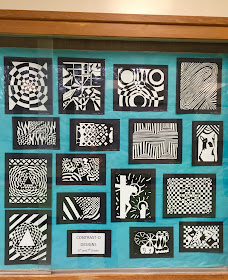7th Grade EXPANDING THE SQUARE
 Materials:
Materials: 9 inch Duet Paper (2 color) squares, Pencil, X-Acto Knife, glue, envelope, 18 x 24 inch black paper
Objective: Create a cut paper collage with a composition where both positive and negative spaces are REVERSED. Use either Symmetrical or Asymmetrical Balance in creating your design.
Vocabulary: Space, Positive Space, Negative Space, Balance, Symmetrical, Asymmetrical
Instructions:
1. Choose a piece of duet paper for the project.
2. LIGHTLY Draw your designs from the edges into the center of the square. Think of the designs as shapes. You should draw on all 4 sides. Do not cut off the corners & don’t go past the center of the paper with any designs. Leave space around all shapes!
3. Teacher will demonstrate the cutting process with the X-Acto knife.
4. Begin cutting shapes from the sides of the square.
Immediately put all shapes into your envelope. DO NOT THROW ANYTHING AWAY!!
5. Glue down the main base in the middle of your black paper straight or diagonally.
6. Place all the cut shapes back into the square.
7. Flip shapes out and glue down in the mirror image from where it was cut.
8. Turn in for evaluation.
EVALUATION:
Students will be evaluated on their craftsmanship, understanding of positive space and negative space, and design balance.
7th Grade Examples:




































